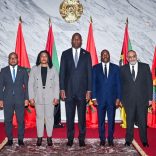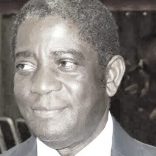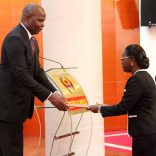Mozambique: President calls for transformative leadership in public universities
Sub-commission created to discuss “the six provinces” – Mozambique peace talks

File photo / Members of the Joint Commission and mediators
The Joint Commission of the political dialogue agreed yesterday to create a sub-commission to prepare a legislative package to facilitate a process of political and administrative decentralisation which will give more decision-making powers to local state organs.
The reforms arise in the context of Renamo demands for the governance of the six provinces where it claims to have secured the majority of the votes in 2014, with an agreement [reached yesterday] of the need for this situation to be discussed in the framework of the “national unity and administrative decentralisation process”.
“The delegation of the president and the delegation of the Renamo president agreed to constitute, within the Joint Commission, and including mediators, a subcommittee tasked with preparing a legislative package to be in place before the next elections ,” the statement signed by the two delegations and the mediation team indicates.
One aspect
The legislative package will address reforms in seven legal instruments, and must be submitted to parliament for consideration by November.
The seven legal instruments to be revised are: the constitution; the bodies of laws concerning local states and their regulations; the law of the provincial assemblies; the law of the provincial governing bodies; the law of provincial finance; the law on the basis and functioning of public administration and the municipalisation model of all districts.
The members of the subcommittee have not yet been named, but according to information brought forward yesterday, it should start its activities this [Thursday] morning.
Positive agreement
The leader of the PDD, Raul Domingos, considered any agreement between the government and Renamo “positive”, since it implies the end of the armed conflict, but he goes on to warn that the mere appointment of governors proposed by Renamo for the provinces claimed by this party could be a “poisoned gift” to Afonso Dhlakama.
The former Renamo number two says that it makes no sense for governors appointed by Renamo to work within an administrative structure dominated by Frelimo.
“They [the governors] should have decision-making power, to create their own work team, including the appointment of provincial directors and district administrators,” Domingos said.
“We need to end this situation where the candidate who gets 51 percent wins everything and the one who gets 49 percent loses everything. We must find a way to empower the person who gets 49 percent of the votes cast. It makes no sense to ignore a candidate who had this level of support in the polls,” says the now-president of the Peace, Democracy and Development party, former student of Political Science in Eduardo Mondlane University, and leader of the Renamo delegation in the negotiations that led to the Comprehensive Peace Agreement in Rome 1992.













Leave a Reply
Be the First to Comment!
You must be logged in to post a comment.
You must be logged in to post a comment.